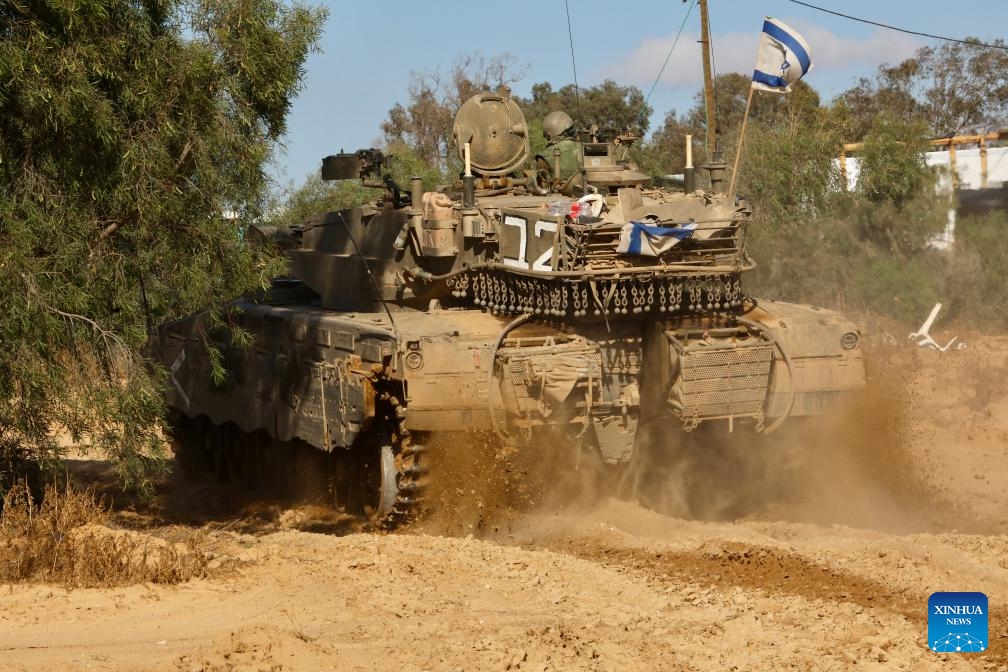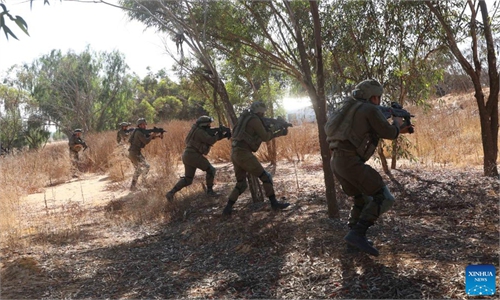Biden's remark on halting arms supply to Israel a show to alleviate domestic pressure: observers

An Israeli tank is seen near the Shalom Kerem crossing in southern Israel bordering the Gaza Strip, on May 6, 2024. Israeli media reported on Monday that Israel's war cabinet has approved the launch of a ground offensive on Rafah that would take place after the civil population is evacuated.(Photo: Xinhua)
For the first time, US President Joe Biden stated that he would stop certain deliveries of American weapons to Israel if Prime Minister Benjamin Netanyahu orders a significant incursion into the Palestinian city of Rafah. Observers interpreted the move as a "show" staged together by the US and Israel to meet their own aims, and won't alter Netanyahu's determination to eradicate Hamas.
The US president had previously stopped the delivery of 3,500 bombs last week due to worries that American weapons could be used to cause further civilian casualties in Rafah. He announced on Wednesday that he would also prevent the transportation of artillery shells.
In an interview with CNN, Biden said he had conveyed to Netanyahu and other Israeli leaders that American support for operations in population centers was limited.
Liu Zhongmin, a professor at the Middle East Studies Institute of Shanghai International Studies University, told the Global Times that although the US is by far the biggest supplier of weapons to Israel, Biden specifically used the word "some" when talking about the halt in weapons shipments, which means the US still hasn't ultimately altered its position of being a supporter of Israel.
With anti-war protests continuing at American universities and the November election looming, Biden finds himself behind Donald Trump in the polls, and his administration must demonstrate a willingness to enact changes. Therefore, the decision to halt certain weapon shipments is seen as just a tactic to send a warning message to Israel, and serves as a temporary measure by the US to ease pressure for his own election interests, Liu noted.
Israel's Ambassador to the UN, Gilad Erdan, reacted to Biden's decision, saying it was a "difficult and very disappointing remark."
Erdan was also quoted by the Times of Israel as saying, "Of course any pressure on Israel is interpreted by our enemies as something that gives them hope. There are many Jewish Americans who voted for the president and for the Democratic Party, and now they are hesitant."
While Jews make up only 3 percent of the entire electorate, the US president won't risk disappointing them, given the huge influence they have over the US presidency, Li Haidong, a professor at the China Foreign Affairs University, told the Global Times.
"We're not walking away from Israel's security," Biden told CNN, "we're walking away from Israel's ability to wage war in those areas," referring to densely populated areas of Rafah where more than one million Palestinians are taking shelter.
In addition to suspending the shipment of ammunition to Israel, in recent times, US politicians have repeatedly expressed so-called "criticism" toward the country. Some analysts believe that these statements are nothing but "smokescreens" aimed at diverting public attention from Israel's ground offensive in Gaza.
Not having support from US weapon supplies doesn't mean Israel is out of weapons to sustain its bombing and attacking. The channels for military supplies from other countries including from Europe as well as reserves will allow Israel to continue its operation. Most importantly, the operation in Rafah will not consume large amounts of ammunition, Liu noted.
Liu stated that Netanyahu has been advancing his strategy through a combination of military actions and diplomatic overtures. By pushing forward on the battlefield to enhance its position during hostage negotiations with Hamas, Israel remains steadfast in its goal of eradicating it.
Israeli troops seized control of Gaza's vital Rafah border crossing on Tuesday. Netanyahu called it an "important step" toward dismantling Hamas' military and governing capabilities, and its defense minister threatened to "deepen" the Rafah operation if talks on the hostage deal failed, AP reported.

